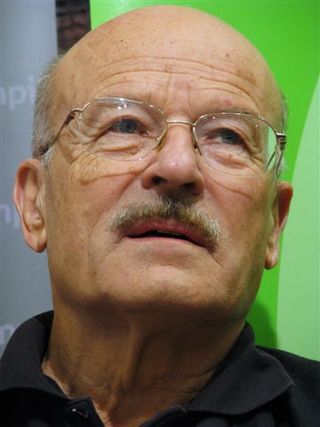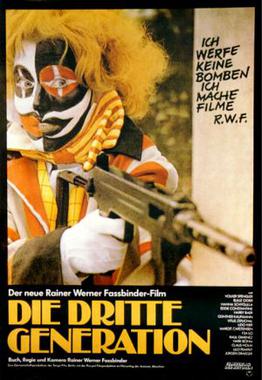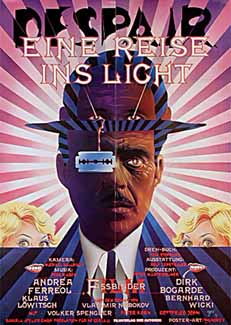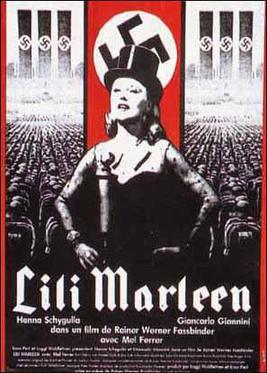
Rainer Werner Fassbinder, sometimes credited as R. W. Fassbinder, was a German filmmaker, actor, and dramatist. He is widely regarded as one of the major figures and catalysts of the New German Cinema movement. Versatile and prolific, his over 40 films span a variety of genres, most frequently blending elements of Hollywood melodrama with social criticism and avant-garde techniques. His films, according to him, explored "the exploitability of feelings". His work was deeply rooted in post-war German culture: the aftermath of Nazism, the German economic miracle, and the terror of the Red Army Faction. He worked with a company of actors and technicians who frequently appeared in his projects.
New German Cinema is a period in German cinema which lasted from 1962 to 1982, in which a new generation of directors emerged who, working with low budgets, and influenced by the French New Wave and Italian Neorealism, gained notice by producing a number of "small" motion pictures that caught the attention of art house audiences. These filmmakers included Percy Adlon, Harun Farocki, Rainer Werner Fassbinder, Peter Fleischmann, Werner Herzog, Alexander Kluge, Ulli Lommel, Wolfgang Petersen, Volker Schlöndorff, Helma Sanders-Brahms, Werner Schroeter, Hans-Jürgen Syberberg, Margarethe von Trotta and Wim Wenders. As a result of the attention they garnered, they were able to create better-financed productions which were backed by the big US studios. However, most of these larger films were commercial failures and the movement was heavily dependent on subsidies. By 1977, 80% of a budget for a typical German film was ensured by a subsidy.

Volker Schlöndorff is a German film director, screenwriter and producer who has worked in Germany, France and the United States. He was a prominent member of the New German Cinema of the late 1960s and early 1970s, which also included Werner Herzog, Wim Wenders, Margarethe von Trotta and Rainer Werner Fassbinder.

The Marriage of Maria Braun is a 1978 West German drama film directed by Rainer Werner Fassbinder. The film stars Hanna Schygulla as Maria, whose marriage to the soldier Hermann remains unfulfilled due to World War II and his post-war imprisonment. Maria adapts to the realities of post-war Germany and becomes the wealthy mistress of an industrialist, all the while staying true to her love for Hermann.

Veronika Voss is a 1982 West German black-and-white drama film directed by Rainer Werner Fassbinder, and starring Rosel Zech, Hilmar Thate, and Cornelia Froboess. Loosely based on the career of actress Sybille Schmitz, the film follows the titular Veronika Voss, a morphine-addicted film star in 1955 Munich who begins an affair with a sports journalist; soon after, he discovers that Veronika is under the control of a corrupt neurologist scheming to bleed her of her wealth.

Ali: Fear Eats the Soul is a 1974 West German drama film written and directed by Rainer Werner Fassbinder, starring Brigitte Mira and El Hedi ben Salem. The film won the International Federation of Film Critics award for best in-competition movie and the Prize of the Ecumenical Jury at the 1974 Cannes Film Festival. It is considered to be one of Fassbinder's most powerful works and is hailed by many as a masterpiece.

Barbara Sukowa is a German actress of screen and stage and singer. She has received three German Film Awards for Best Actress, three Bavarian Film Awards, Cannes Film Festival Award for Best Actress, Venice Film Festival Award, as well as nominations for European Film Awards, César Awards and Grammy Awards.

Michael Ballhaus, A.S.C. was a German cinematographer who collaborated with directors such as Rainer Werner Fassbinder, Martin Scorsese, Mike Nichols, James L. Brooks, and Wolfgang Petersen. He was a member of both the Academy of Arts, Berlin, and the American Society of Cinematographers.

Mother Küsters' Trip to Heaven is a 1975 German film written and directed by Rainer Werner Fassbinder. It stars Brigitte Mira, Ingrid Caven, Karlheinz Böhm and Margit Carstensen. The film was shot over 20 days between February and March 1975 in Frankfurt am Main. The film drew on both Sirk-style melodramas and Weimar era workers' films to tell a political coming of age story.

Berlin Alexanderplatz, originally broadcast in 1980, is a 14-part West German crime television miniseries, set in 1920s Berlin and adapted and directed by Rainer Werner Fassbinder from Alfred Döblin's 1929 novel of the same name. It stars Günter Lamprecht, Hanna Schygulla, Barbara Sukowa, Elisabeth Trissenaar and Gottfried John. The complete series is 15 hours.

The Third Generation is a 1979 West German film, a black comedy about terrorism, written and directed by Rainer Werner Fassbinder. The plot follows an ineffectual cell of underground terrorists who plan to kidnap an industrialist.
Volker Spengler was a German stage and film actor. Spengler was best known to international audiences as a member of director Rainer Werner Fassbinder's acting ensemble, including his role as the transsexual Erwin/Elvira of Fassbinder's In a Year of 13 Moons (1978). Spengler appeared in about 40 film and television productions between 1966 and 2004, also working with other directors such as Christoph Schlingensief and Volker Schlöndorff. On stage, he performed at Berlin's Volksbühne and with the Berliner Ensemble.

Despair is a 1978 film directed by Rainer Werner Fassbinder and starring Dirk Bogarde, based on the 1934 novel of the same name by Vladimir Nabokov. It was Fassbinder's first English-language film and was entered into the 1978 Cannes Film Festival.

Lili Marleen is a 1981 West German drama film directed by Rainer Werner Fassbinder that stars Hanna Schygulla, Giancarlo Giannini, and Mel Ferrer. Set in the time of the Third Reich, the film recounts the love affair between a German singer who becomes the darling of the nation, based on Lale Andersen, and a Swiss conductor, based on Rolf Liebermann, who is active in saving his fellow Jews. Though the screenplay uses the autobiographical novel Der Himmel hat viele Farben by Lale Andersen, her last husband, Arthur Beul, said the film bears little relation to her real life.

Effi Briest is a 1974 West German black-and-white historical drama film directed, written and narrated by Rainer Werner Fassbinder, and produced by Juliane Lorenz. Fassbinder adapted the screenplay from German author Theodor Fontane's 1894 novel of the same name about a young 19th century woman whose affair with a charismatic womanizer has long-term effects on her marriage to an older man. The film uses Fontane's words in dialogue, narration and text of letters.

Günther Kaufmann was a German film actor best known for his association with director Rainer Werner Fassbinder. Fassbinder directed Kaufmann in a total of 14 films, casting him in leading and minor roles. Kaufmann was also romantically involved with the director for a time.

Chinese Roulette is a 1976 West German film written and directed by Rainer Werner Fassbinder. It stars Margit Carstensen, Ulli Lommel, and Anna Karina. The film, a bleak psychological drama, climaxes with a truth-guessing game, which gives the film its title. The plot follows a bourgeois married couple whose infidelities are exposed by their disabled child.

Gods of the Plague is a 1970 West German black-and-white drama film directed by Rainer Werner Fassbinder.

Enfant Terrible is a 2020 German drama film directed by Oskar Roehler about the German film director Rainer Werner Fassbinder. It was selected to be shown at the 2020 Cannes Film Festival.
Fear of Fear is a 1975 West German drama film by Rainer Werner Fassbinder starring Margit Carstensen. Fear of Fear is the fifth film by R. W. Fassbinder for the WDR in cooperation with editor Peter Märthesheimer.

















